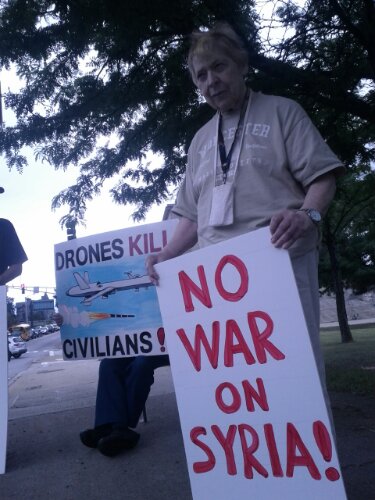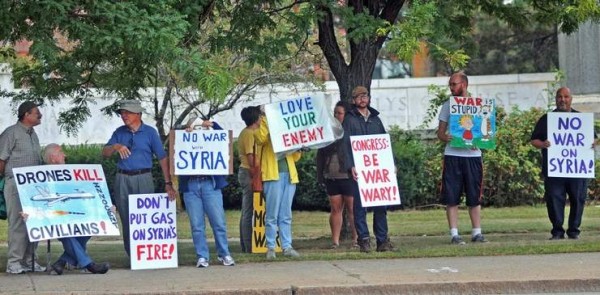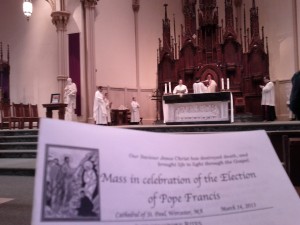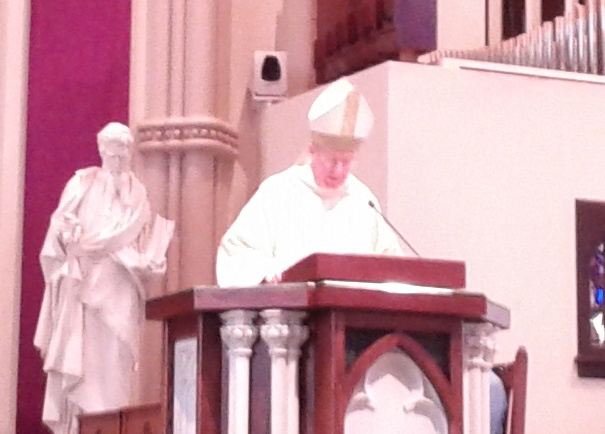As a lifelong Catholic and environmentalist, I am happy that today Pope Francis has decided the Roman Catholic Church will join the Orthodox Church in marking the World Day of Prayer for the Care of Creation.
The big Catholic environmental news of the summer was, of course, the release of the pope’s environmental encyclical, Laudato si’ (Praise Be). It covers a wide range of environmental and theological issue, often in a depth that surprised me. I think it’s the sort of document that, if you think you’d appreciate it, you would, and if you think you wouldn’t, you wouldn’t. You don’t have to be Catholic: as Pope Francis writes, “In this Encyclical, I would like to enter into dialogue with all people about our common home.”
The letter is 45,000 words long, and there have probably been 450,000 articles published about it. Fr. James Martin’s overview is pretty good. Most of the articles I’ve seen have tried to understand it in the context of American politics. My favorite on the left is Elizabeth Bruenig’s “Pope Francis’s Vision of a Moral Ecology Will Challenge Both Republicans and Democrats: His encyclical almost dares politicians to politicize it.” My favorite on the right is Rod Dreher’s more personal “Harmony, Communion, Incarnation.” The one article that touches on theological aspects that are a bit beyond me is Mark K. Spencer’s “Pope Francis, Platonist Traditionalist.”
But before you read more than one thinkpiece, you should be sure to read the encyclical itself. It’s full of great stuff like this line from Pope John Paul II, a quote which surprised me:
[Saint John Paul II] clearly explained that “the Church does indeed defend the legitimate right to private property, but she also teaches no less clearly that there is always a social mortgage on all private property, in order that goods may serve the general purpose that God gave them”.
“Social mortgage.” That’s a great way of framing it.
Even if you don’t read the whole thing, anyone reading this blog will want to check out the prayers at the end, “A prayer for our earth” and “A Christian prayer in union with creation.”
I’ll end by quoting my favorite long passage, “A Universal Communion”:
V. A UNIVERSAL COMMUNION
The created things of this world are not free of ownership: “For they are yours, O Lord, who love the living” (Wis 11:26). This is the basis of our conviction that, as part of the universe, called into being by one Father, all of us are linked by unseen bonds and together form a kind of universal family, a sublime communion which fills us with a sacred, affectionate and humble respect. Here I would reiterate that “God has joined us so closely to the world around us that we can feel the desertification of the soil almost as a physical ailment, and the extinction of a species as a painful disfigurement”.
This is not to put all living beings on the same level nor to deprive human beings of their unique worth and the tremendous responsibility it entails. Nor does it imply a divinization of the earth which would prevent us from working on it and protecting it in its fragility. Such notions would end up creating new imbalances which would deflect us from the reality which challenges us. At times we see an obsession with denying any pre-eminence to the human person; more zeal is shown in protecting other species than in defending the dignity which all human beings share in equal measure. Certainly, we should be concerned lest other living beings be treated irresponsibly. But we should be particularly indignant at the enormous inequalities in our midst, whereby we continue to tolerate some considering themselves more worthy than others. We fail to see that some are mired in desperate and degrading poverty, with no way out, while others have not the faintest idea of what to do with their possessions, vainly showing off their supposed superiority and leaving behind them so much waste which, if it were the case everywhere, would destroy the planet. In practice, we continue to tolerate that some consider themselves more human than others, as if they had been born with greater rights.
A sense of deep communion with the rest of nature cannot be real if our hearts lack tenderness, compassion and concern for our fellow human beings. It is clearly inconsistent to combat trafficking in endangered species while remaining completely indifferent to human trafficking, unconcerned about the poor, or undertaking to destroy another human being deemed unwanted. This compromises the very meaning of our struggle for the sake of the environment. It is no coincidence that, in the canticle in which Saint Francis praises God for his creatures, he goes on to say: “Praised be you my Lord, through those who give pardon for your love”. Everything is connected. Concern for the environment thus needs to be joined to a sincere love for our fellow human beings and an unwavering commitment to resolving the problems of society.
Moreover, when our hearts are authentically open to universal communion, this sense of fraternity excludes nothing and no one. It follows that our indifference or cruelty towards fellow creatures of this world sooner or later affects the treatment we mete out to other human beings. We have only one heart, and the same wretchedness which leads us to mistreat an animal will not be long in showing itself in our relationships with other people. Every act of cruelty towards any creature is “contrary to human dignity”.[69] We can hardly consider ourselves to be fully loving if we disregard any aspect of reality: “Peace, justice and the preservation of creation are three absolutely interconnected themes, which cannot be separated and treated individually without once again falling into reductionism”. Everything is related, and we human beings are united as brothers and sisters on a wonderful pilgrimage, woven together by the love God has for each of his creatures and which also unites us in fond affection with brother sun, sister moon, brother river and mother earth.
![[plate clatters] [sighs]](https://www.PieAndCoffee.org/wp-content/uploads/IMG_20180827_1004062912.jpg)




